Polite Nice Positive And Friendly Resignation Letter
[Your Name]
[Your Address]
[City, State, ZIP Code]
[Your Email Address]
[Your Phone Number]
[Today's Date]
[Recipient's Name]
[Company Name]
[Company Address]
[City, State, ZIP Code]
Dear [Recipient's Name],
I hope this letter finds you well. I am writing to formally submit my resignation from my position as [Your Job Title] at [Company Name]. It is with a mix of emotions that I have made this decision, as I have genuinely enjoyed my time here and have had the pleasure of working with wonderful colleagues like yourself.
Over the course of my employment, I have grown both personally and professionally, and I am grateful for the opportunities and support that [Company Name] has provided me throughout my tenure. The positive experiences and memories I have made here will be cherished for years to come.
After careful consideration, I have decided to pursue a new career path that aligns with my long-term goals and aspirations. My last day of work will be [Last Working Day], providing ample time for a smooth transition of my responsibilities. I am committed to ensuring a seamless handover and will gladly assist in training my successor during this period.
I would like to extend my heartfelt thanks to you and the entire team for your kindness, encouragement, and mentorship during my time at [Company Name]. The collaborative and friendly work environment has been instrumental in my professional development.
Please know that I am open to discussing any aspects of my departure and am willing to assist in any way possible during this transitional phase. I want to leave on the best of terms and maintain strong relationships with everyone at [Company Name].
I genuinely wish the company continued success and growth. I have no doubt that under your leadership and the dedication of the team, [Company Name] will achieve even greater milestones in the future.
Thank you again for everything. It has been an absolute pleasure working with you all, and I will always cherish the friendships and experiences I gained here.
Wishing you and the team all the best.
Sincerely,
[Your Name]
Standard Professional Resignation Letter
Subject: Resignation - [Your Name]
Dear [Manager's Name],
I am writing to formally notify you of my resignation from my position as [Job Title] with [Company Name]. My last day of work will be [Date - typically two weeks from today].
This decision was not made lightly, and I am grateful for the opportunities for professional and personal growth during my time here. I have enjoyed working with the team and appreciate the support provided to me.
During my remaining time, I am committed to ensuring a smooth transition. I am happy to assist in training my replacement and will work diligently to complete my current projects.
Thank you for your understanding. I wish you and the company continued success.
Sincerely,
[Your Name]
Career Advancement Resignation Email
Subject: Resignation Notice - [Your Name]
Dear [Manager's Name],
I hope this email finds you well. I am writing to inform you that I have accepted a new position that aligns with my long-term career goals, and therefore I will be resigning from my role as [Job Title]. My final day will be [Date].
I want to express my sincere gratitude for the incredible learning experiences and professional development opportunities you and the team have provided. The skills and knowledge I've gained here will undoubtedly contribute to my future success.
I am fully committed to making this transition as seamless as possible. I will ensure all my projects are up to date and am happy to help train whoever will be taking over my responsibilities.
Thank you for being such a supportive manager and for understanding my decision to pursue this new opportunity.
Warm regards,
[Your Name]
Relocation Resignation Letter
Subject: Resignation Due to Relocation - [Your Name]
Dear [Manager's Name],
I am writing to formally notify you of my resignation from my position as [Job Title] with [Company Name]. Due to personal circumstances requiring my relocation to [City/State/Country], my last day of employment will be [Date].
This was an extremely difficult decision as I have truly valued my time with the company and the relationships I've built with my colleagues. The experience and professional growth I've gained here have been invaluable.
I am committed to ensuring a smooth transition over the next two weeks. I will work closely with you to document my current projects and assist in finding and training my replacement.
I sincerely appreciate your understanding during this transition and hope to maintain the positive relationships I've built here.
Best regards,
[Your Name]
Family Circumstances Resignation Message
Subject: Resignation - Family Circumstances
Dear [Manager's Name],
I hope you are doing well. After much consideration, I have decided to resign from my position as [Job Title] to focus on important family matters that require my full attention. My final day of work will be [Date].
This decision has been incredibly difficult as I have enjoyed working with such a wonderful team and contributing to the company's success. I am grateful for the understanding and flexibility you have shown me during challenging times.
I want to ensure a smooth transition and will do everything possible to wrap up my current responsibilities and assist in finding a suitable replacement.
Thank you for your support and understanding. I hope to stay in touch and wish everyone continued success.
With appreciation,
[Your Name]
Educational Pursuit Resignation Letter
Subject: Resignation to Pursue Educational Opportunities
Dear [Manager's Name],
I am writing to inform you of my decision to resign from my position as [Job Title] to pursue further education. I have been accepted into [Program/Degree] at [Institution], and my last day of work will be [Date].
Working at [Company Name] has been an enriching experience that has solidified my passion for [Field/Industry]. The knowledge and skills I've developed here have prepared me well for this next academic chapter.
I am committed to completing all my current projects and will work diligently to ensure a smooth handover of my responsibilities. I would be happy to assist in training my successor.
I appreciate the support and mentorship I have received and hope to apply what I learn in my studies to contribute even more effectively to our industry in the future.
Thank you for your understanding and continued support.
Best wishes,
[Your Name]
Health-Related Resignation Email
Subject: Resignation - Health Considerations
Dear [Manager's Name],
I hope this message finds you well. After careful consideration and consultation with my healthcare providers, I have made the difficult decision to resign from my position as [Job Title] to focus on my health and recovery. My final day will be [Date].
I want to express my heartfelt gratitude for the supportive work environment and the understanding you have shown during my health challenges. The flexibility and care from the entire team have meant more to me than words can express.
I will work diligently over the next two weeks to ensure all my responsibilities are properly transferred and that my departure causes minimal disruption to the team and ongoing projects.
Thank you for being such an understanding and compassionate manager. I hope to maintain the friendships I've built here.
With gratitude,
[Your Name]
Retirement Resignation Letter
Subject: Retirement Announcement - [Your Name]
Dear [Manager's Name],
After [Number] years of dedicated service with [Company Name], I am writing to formally announce my retirement from my position as [Job Title]. My final day of employment will be [Date].
Reflecting on my time here, I am filled with gratitude for the incredible journey, the professional relationships I've built, and the opportunity to contribute to the company's growth and success. Working alongside such talented individuals has been one of the highlights of my career.
I am committed to ensuring a comprehensive transition of my responsibilities. I will prepare detailed documentation of my current projects and am available to assist in training my replacement.
Thank you for the trust, support, and friendship you have shown me throughout my tenure. I look forward to staying connected and watching the company's continued success.
With warm regards and best wishes,
[Your Name]
Short Notice Resignation Message
Subject: Immediate Resignation - [Your Name]
Dear [Manager's Name],
I am writing to inform you of my resignation from my position as [Job Title], effective [Date - less than two weeks from today]. I understand this is shorter notice than typically expected, and I sincerely apologize for any inconvenience this may cause.
Due to [Brief explanation - urgent family matter/immediate start date for new position/health emergency], I am unable to provide the standard two weeks' notice. This decision was not made lightly, and I regret that circumstances require such short notice.
Despite the abbreviated timeline, I am committed to doing everything possible to minimize the impact of my departure. I will work intensively to complete urgent tasks and provide detailed notes on my ongoing projects.
I am grateful for the opportunities and experiences I've had here and apologize again for the short notice. Thank you for your understanding during this challenging time.
Respectfully,
[Your Name]
What is a Polite, Nice, Positive and Friendly Resignation Letter and Why Do You Need One
A polite, nice, positive and friendly resignation letter is a professional document that formally notifies your employer of your intention to leave while maintaining a respectful, appreciative, and constructive tone. Unlike abrupt or negative resignations, this approach prioritizes preserving relationships, expressing gratitude, and ensuring a smooth transition. The purpose is to leave on the best possible terms, maintaining your professional reputation and keeping doors open for future opportunities, references, or potential collaboration.
Who Should Send This Type of Resignation Letter
- Employees at any level who want to maintain positive relationships with their current employer
- Professionals seeking to preserve their industry reputation and networking connections
- Individuals who may want to return to the company in the future or work with colleagues again
- Anyone who values their manager or team members as professional references
- Workers who have had positive experiences and want to show appreciation
- Employees in small industries where reputation matters significantly
- Those transitioning to roles where their current employer might become a client or partner
To Whom Should This Letter Be Addressed
- Primary recipient: Your direct supervisor or manager
- Secondary copies: HR department, department head, or regional manager (depending on company policy)
- In larger organizations: Both immediate supervisor and HR business partner
- For remote workers: Include your immediate manager and any relevant regional leadership
- Executive-level positions: Board members or company owners may need notification
- Project-based roles: Project managers and client relationship managers
- Always check company handbook: Some organizations have specific protocols for resignation notification hierarchy
When to Send a Polite and Positive Resignation Letter
- Career advancement: Accepting a promotion or better opportunity elsewhere
- Relocation scenarios: Moving to a different city, state, or country for personal reasons
- Educational pursuits: Returning to school for advanced degrees or professional development
- Family circumstances: Need to care for family members or significant life changes
- Health considerations: When health issues require career changes or extended time off
- Retirement: Formal announcement of retirement after years of service
- Industry transitions: Changing career paths or moving to different industries
- Work-life balance: Seeking positions with better work-life integration
- Entrepreneurial ventures: Starting your own business or joining a startup
How to Write and Send Your Resignation Letter
- Plan ahead: Draft your letter when you're calm and have thought through your decision
- Start with gratitude: Begin by expressing appreciation for opportunities and experiences
- Be direct but diplomatic: Clearly state your resignation while maintaining a positive tone
- Provide adequate notice: Typically two weeks, but consider your role's complexity and company needs
- Offer transition support: Show willingness to train replacement and complete projects
- Keep it professional: Avoid negative comments about the company, management, or colleagues
- Schedule a face-to-face meeting: Deliver the news in person first, then follow with the written letter
- Choose appropriate timing: Avoid busy periods, major deadlines, or significant company events
Formatting Guidelines and Best Practices
- Length: Keep it concise, typically one page or 3-4 paragraphs
- Tone: Professional, grateful, and forward-looking
- Format: Business letter format for printed versions, professional email format for digital delivery
- Subject line: Clear and direct (e.g., "Resignation - [Your Name]")
- Greeting: Use formal salutation with your manager's name
- Body structure: Notice statement, gratitude, transition offer, closing
- Closing: Professional sign-off with your full name
- Timing of delivery: Send during business hours, preferably early in the week
- Method: Email for immediate delivery, followed by printed copy if company culture requires it
Requirements and Prerequisites Before Sending
- Review employment contract: Check notice period requirements and any restrictive covenants
- Understand company policy: Read employee handbook for resignation procedures
- Secure new position: Ensure your new job offer is confirmed and in writing
- Financial planning: Calculate final paycheck, unused vacation time, and benefits transition
- Document preparation: Gather personal files and remove personal items gradually
- Project status review: Assess current responsibilities and create transition plans
- Reference preparation: Identify colleagues who might serve as future references
- Personal relationships: Consider how to maintain professional friendships after departure
After Sending Your Resignation Letter - Follow-up Actions
- Schedule transition meetings: Work with your manager to plan knowledge transfer
- Document your processes: Create detailed guides for your replacement
- Complete ongoing projects: Finish what you can and provide status updates on continuing work
- Train your replacement: Be available for questions and provide comprehensive handover
- Return company property: Gather all equipment, access cards, and confidential materials
- Update contact information: Provide personal contact details for future communication
- Express gratitude: Thank team members individually and maintain positive relationships
- Professional networking: Connect with colleagues on LinkedIn and maintain professional network
- No follow-up required: Unlike complaint letters, resignation letters typically don't need confirmation of receipt
Advantages and Disadvantages of This Approach
Pros:
- Preserves professional relationships and reputation
- Maintains eligibility for rehire and positive references
- Creates goodwill that may benefit future career opportunities
- Demonstrates professionalism and emotional intelligence
- Facilitates smoother transition process
- Keeps networking doors open within the industry
Cons:
- May not address underlying workplace issues that caused resignation
- Could be seen as insincere if the real reasons for leaving are negative
- Requires emotional restraint even in difficult situations
- May not provide closure if you've experienced workplace problems
- Takes more effort than a simple, direct resignation
Common Mistakes to Avoid
- Over-explaining your reasons: Keep explanations brief and professional
- Apologizing excessively: One sincere apology for any inconvenience is sufficient
- Making promises you can't keep: Don't commit to availability you can't provide
- Burning bridges: Avoid any negative comments, even if you've had bad experiences
- Inadequate notice: Respect standard notice periods unless absolutely unavoidable
- Forgetting to express gratitude: Always acknowledge positive aspects of your experience
- Being too casual: Maintain professional tone even in friendly work environments
- Revealing new employer details: Keep information about your next role minimal
- Procrastinating: Don't delay sending your resignation once you've made the decision
Tips and Best Practices for Success
- Practice your verbal resignation: Prepare what you'll say when delivering the news in person
- Time it strategically: Consider your manager's schedule and current workplace stress levels
- Be prepared for immediate departure: Some companies may ask you to leave immediately
- Stay positive during your notice period: Maintain excellent work quality until your last day
- Document everything: Keep copies of your resignation letter and any related correspondence
- Offer specific help: Instead of vague offers, suggest concrete ways you can assist with transition
- Follow company culture: Match your letter's formality to your workplace environment
- Keep it confidential: Don't discuss your resignation with colleagues until after notifying management
- Plan your announcement: Consider how you'll inform your team and when to update your LinkedIn

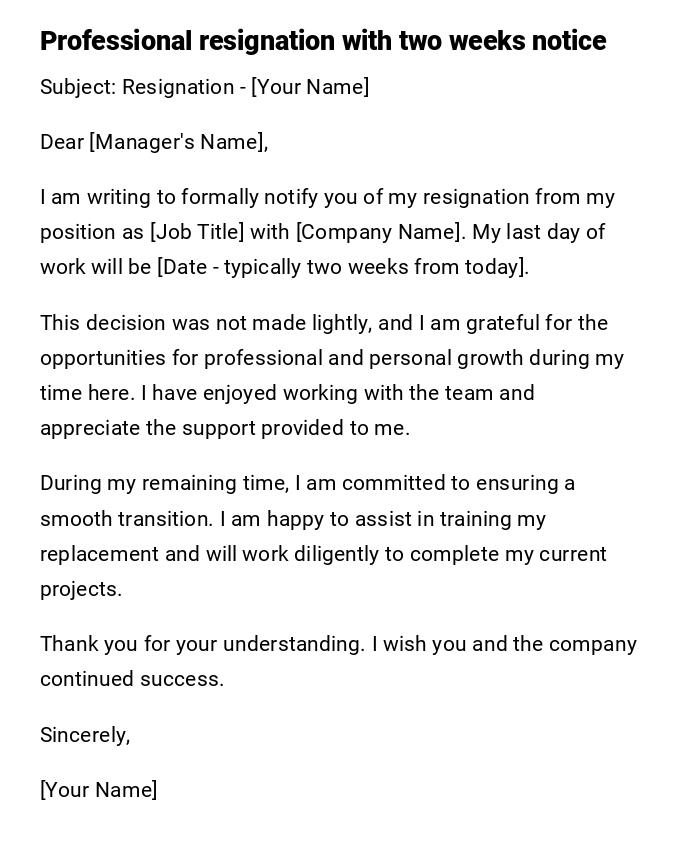
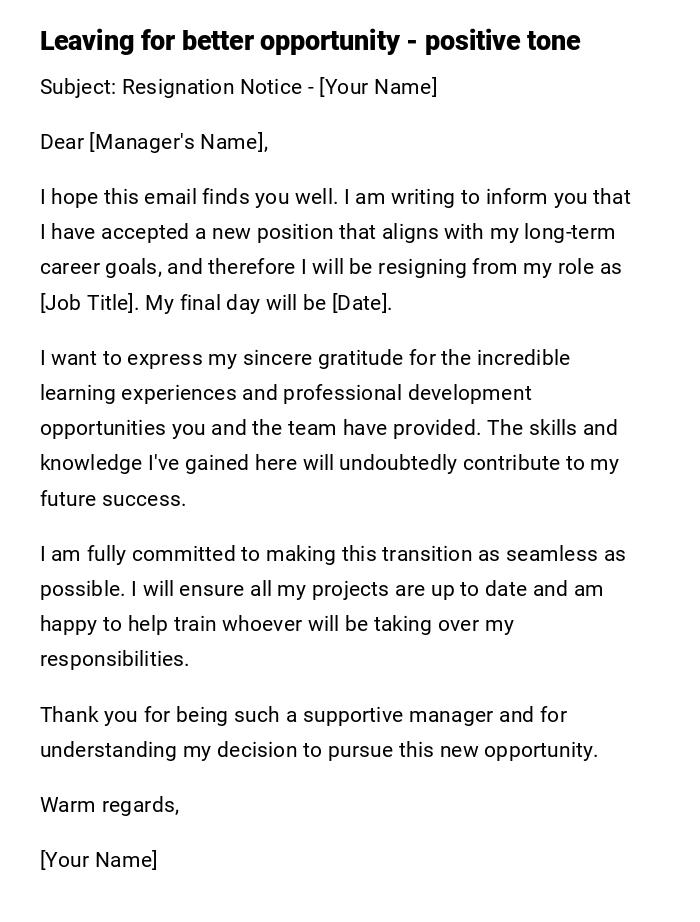
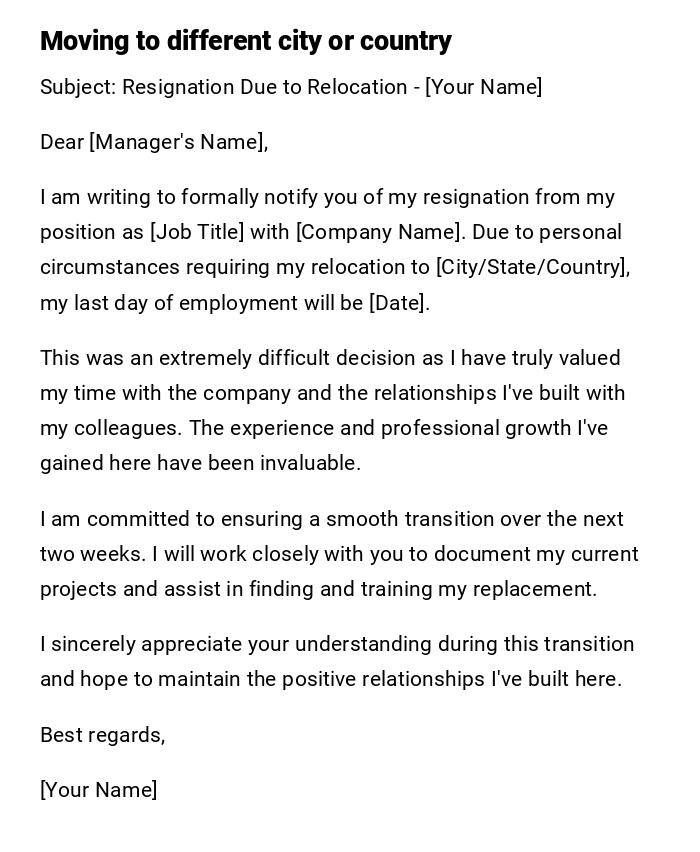
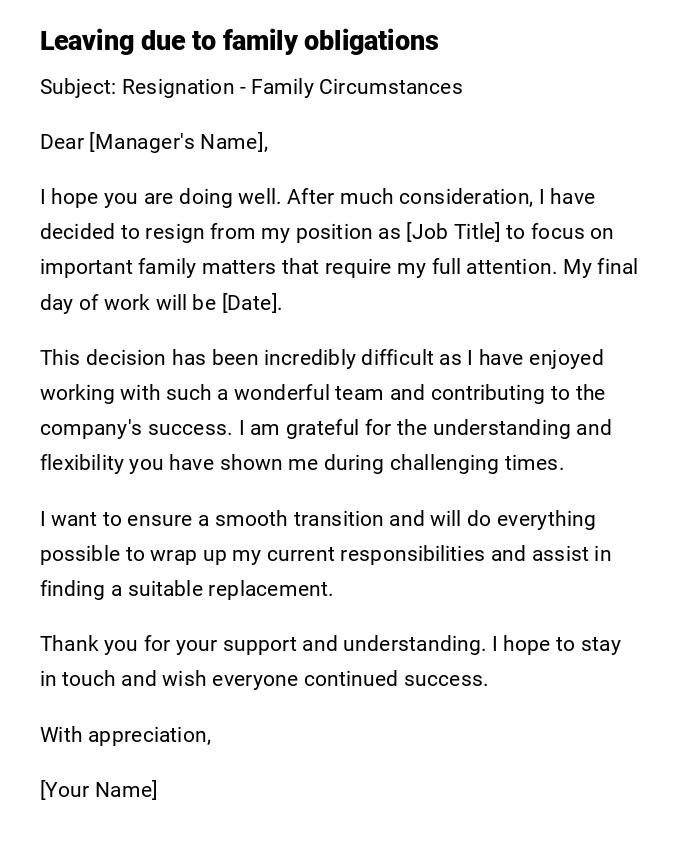
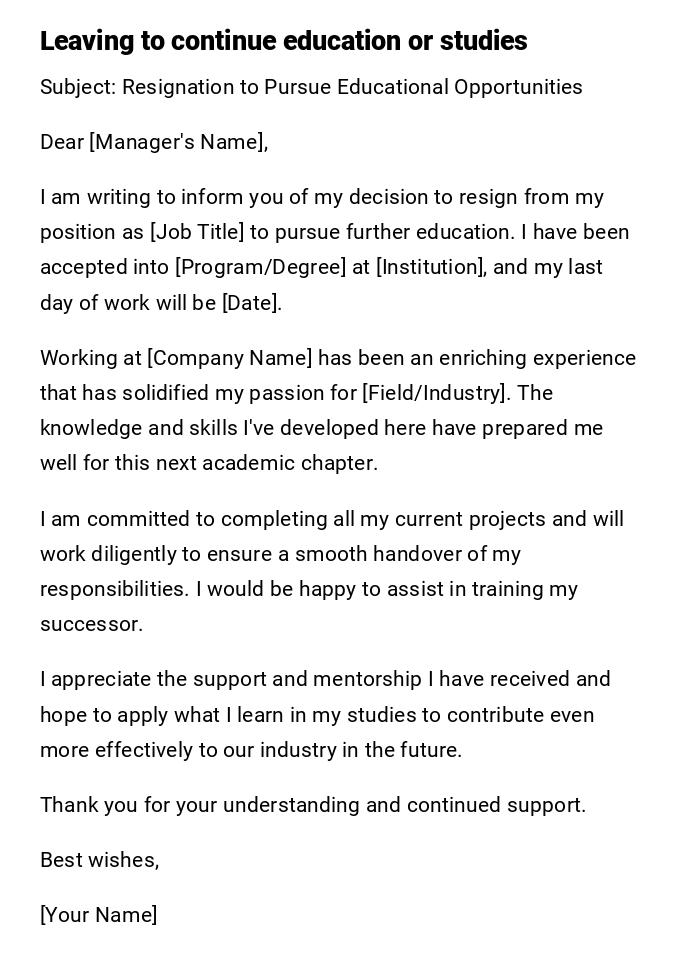
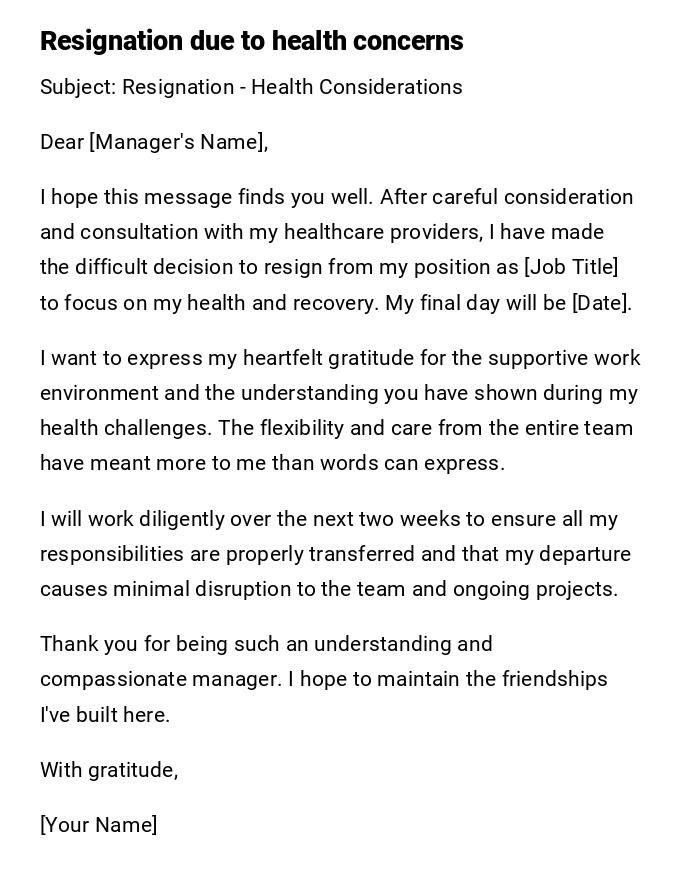
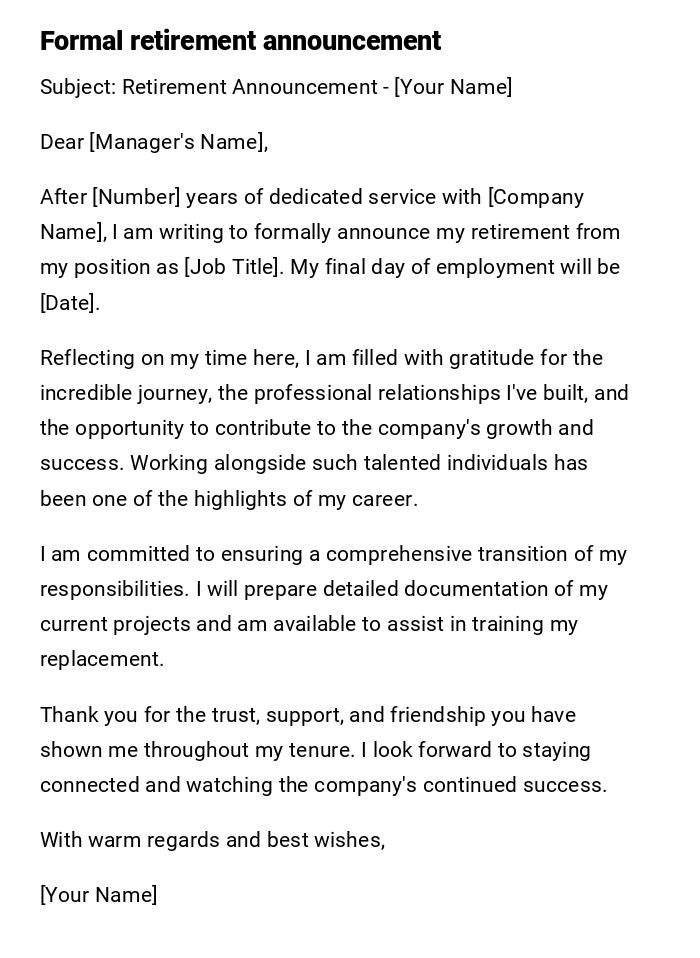
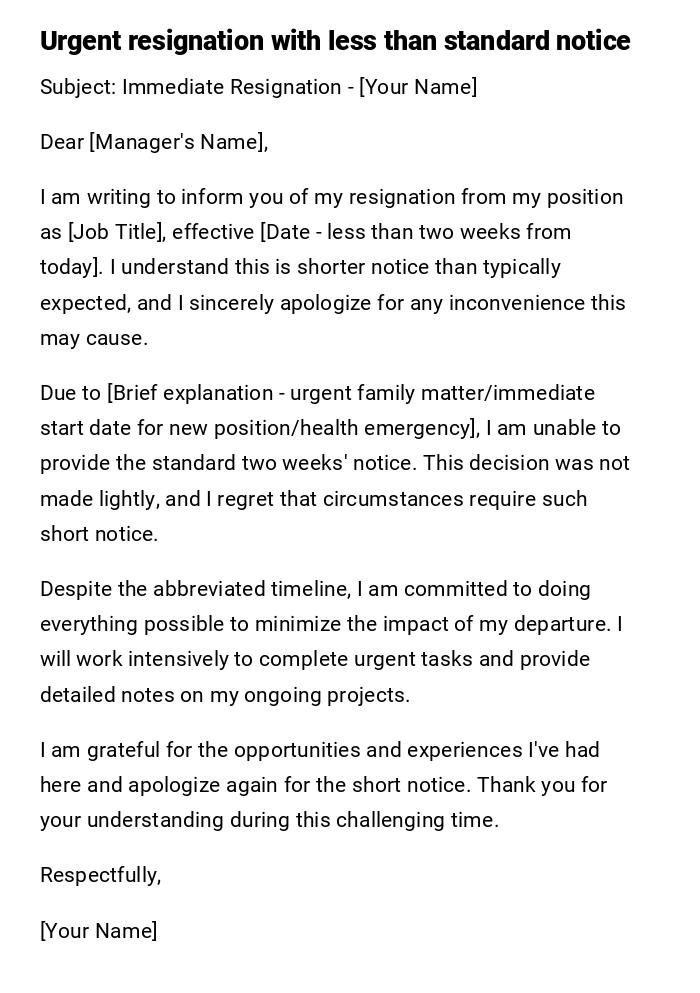

 Download Word Doc
Download Word Doc
 Download PDF
Download PDF